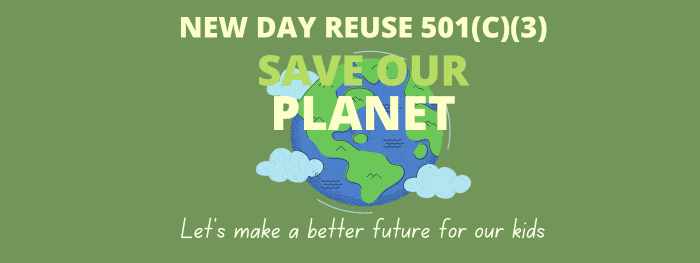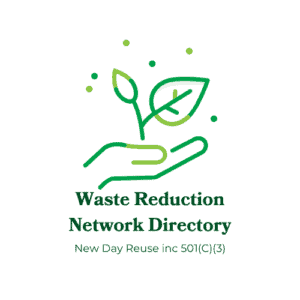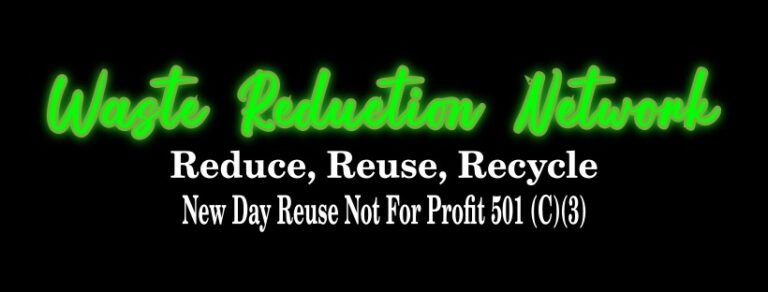New Day ReUse is a 501(c)(3) not for profit organization

New Day Reuse 501 (C)(3) Not for profit waste reduction network, free directory to help reduce waste in landfills.
A directory to help reduce waste in landfills can be a valuable resource for individuals and businesses looking for sustainable alternatives for disposing of items they no longer need. This might include information on recycling centers, donation centers, repurposing options, or other waste reduction solutions.
The New Day Reuse Waste Reduction Network Directory can offer various benefits to your community by promoting sustainable practices and reducing the negative environmental impact of waste. Here are some ways in which our directory can help:
Resource Information: The directory can provide information on local resources like recycling centers, donation centers, composting facilities, and hazardous waste disposal sites. This makes it easier for community members to find responsible ways to dispose of their waste.
Reduce Landfill Waste: By directing people to recycling and donation centers, the directory helps divert materials away from landfills, thereby reducing the amount of waste that ends up in landfills.
Promote Recycling: It can educate community members about the importance of recycling and the materials that can be recycled. This knowledge can encourage more people to participate in recycling programs.
Encourage Reuse: The directory can highlight options for reusing items. This might include information about thrift stores, swap meets, or organizations that collect and redistribute used goods.
Support Local Businesses: Promoting businesses that focus on sustainability and waste reduction can help stimulate the local economy. People may be more inclined to support such businesses, which can, in turn, create jobs and economic growth in the community.
Reduce Illegal Dumping: When people have access to convenient waste reduction options, they are less likely to resort to illegal dumping, which can harm the environment and public health.
Environmental Education: The directory can serve as an educational tool, providing information about the environmental impact of waste and the benefits of waste reduction. This can help raise awareness and drive behavioral change.
Community Engagement: Developing and maintaining the directory can involve community members and organizations, fostering a sense of shared responsibility for waste reduction efforts.
Government and Policy Support: A well-maintained directory can be a valuable resource for local governments and policymakers in developing waste reduction and recycling initiatives. It can provide data and insights into the specific needs and opportunities in the community.
Environmental Benefits: Ultimately, by reducing the amount of waste sent to landfills, your directory can contribute to a cleaner environment, reduced greenhouse gas emissions, and a healthier, more sustainable community.
In summary, a Waste Reduction Directory is a practical and informative tool that can empower communities to make more environmentally responsible choices when it comes to waste disposal. It can be a catalyst for positive change, leading to reduced waste in landfills and a greater focus on sustainability within the community.
Global Warming
Donating, and Recycling items helps reduce waste in Landfills, At the landfill, the items that trash contains is decomposing and releasing methane, a greenhouse gas that’s 28 times more potent than carbon dioxide.
Community Partnerships
Our program helps out local communities with waste reduction by Re-USING & Upcycling! Please help us out to Reduce, Re-USE, Recycle!
ReUse & Upcycling
The environmental impact of textile production. From their fabrication, transportation to market, washing, and disposal; clothes can make quite an impact on our global environment
- Did you know that the EPA estimates that textiles make up 5% of all landfills in the US (Estimated 12.8 Million Tons)?
- Or that only 15% of unwanted clothing is actually recycled?
- Or that the average US citizen throws away an estimated 70 lbs worth of textile waste annually?
- When we think of waste, we often envision things like crushed up plastic water bottles, soiled food wrappers and dirty diapers – not a perfectly wearable pair of jeans that got thrown away just because they don’t fit anymore.
rich soil amendments. The EPA promotes composting as a sustainable waste management practice.
Electronic Waste (E-waste): The EPA focuses on managing electronic waste responsibly through recycling and proper disposal. E-waste contains valuable materials that can be recovered and reused.
Hazardous Waste Reduction: The EPA provides information and resources to help businesses and individuals properly manage and reduce hazardous waste. Reducing hazardous waste is crucial for public health and the environment.
Waste Reduction at Home: The EPA offers tips and resources for individuals and households to reduce waste at home, including reducing, reusing, and recycling items to lessen the environmental impact of household waste.
Waste Reduction in Industry: The EPA collaborates with industries to implement waste reduction practices, increase efficiency, and minimize waste generation, thus reducing environmental impacts and cutting costs.
Sustainable Materials Management: The EPA’s Sustainable Materials Management (SMM) program emphasizes the importance of considering the entire lifecycle of materials, from extraction and production to disposal. SMM aims to reduce the environmental impacts of materials and waste generation.
Public Awareness: The EPA runs public awareness campaigns and educational programs to inform the public about the importance of waste reduction, recycling, and responsible waste management.
Regulations and Guidelines: The EPA establishes regulations and guidelines for various waste management practices to ensure the protection of public health and the environment.
These initiatives and facts underscore the EPA’s commitment to reducing waste and promoting sustainable practices in waste management to protect the environment and conserve valuable resources. Waste reduction is a critical element of a more sustainable and environmentally friendly future. But none of the rules will work if we the citizens don’t follow the rules to help our local communities.


